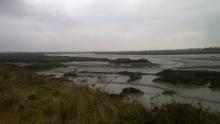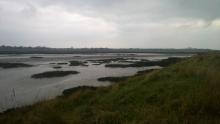back up to https://onebubble.earth
Focussing the mind
I deliberately got myself into a slightly uncomfortable situation on my last training sail.
I set out too late on a cold March day and went off downwind and downtide too far to get back in daylight. I know this easy bit of Essex coast pretty well - so didn't ever feel threatened - but I wanted to experience it to find out what I need if I get caught out in fading light. To give my predicament a genuine dose of stickiness I also tried (with the gloom setting in - error 1; at mid tide, on neaps - error 2) to put in a loop of Mersea Island. I'll omit the muddy details, but suffice to say the upwind reversal out of a 6 inch deep gloop-lined channel was as difficult as it was 'hilarious'.
It was however a worthwhile exercise.
For the outward leg I set off with a sideshore force 4 wind and made excellent downwind progress covering just shy of 30km in not much more than an hour. The excursion up behind Mersea island cemented the nocturnal conclusion to the trip and it was already very gloomy by the time I was back out in open water.
Lesson 1. Night sailing, if you are going to do it, would be better with some moonlight. I'd chosen a blanket cloud covered sky, and no moon in sight. Not seeing the waves makes it quite difficult and you can't predict the motion of the board. Tacking at night became much more precarious.
Lesson 2. Don't expect folk not to worry. I took a phone and on flatter water was able to make a couple of calls to let folk at home know I'd 'be a bit late back, but not to worry'. When it got dark though, I also ignored a couple of incoming calls as it wasn't so easy sailing by then, which probably added to the worry of the folks back home.
Lesson 3. You need a light. Not just to be seen (which in different circumstances could be essential), but also to sort out any problems. I had (as a preventative measure) replaced a piece of frayed outhaul line before setting off, so - as I thumped through the waves heading back upwind - the problems I would have had doing this at sea at night were very present in my mind. Without a light you would be trying to do this by touch. In moderately lumpy conditions the only way to this would be swimming around at the end of the boom with waves washing over your head - so you'd better make sure that light has a good waterproof rating.
Lesson 4. Don't expect anyone to see you. Fairly obvious, but easily confirmed. I passed just a few dozen metres behind an under tow barge carrying sea defence materials and the guys on there would have had no idea of my presence despite me passing close enough behind to warrant dropping my rig in the gusts caused by their wind shadow. I saw some fishermen too, pretty sure they didn't see me.
Lesson 5. Bad decisions. I headed back in one hit without stopping and as I went around the coast the wind increased and sea state became lumpier. By halfway point I'd already cranked the outhaul to the end of the boom to flatten and depower, and had it been daylight I would have beached to increase boom length and enable me to depower the sail more effectively. But with the little light there was I wanted to keep pressing on without delay, so I didn't stop and ended up sailing a bit over-juiced and using more energy than necessary. This was a 'decision' forced upon me by failing light and insufficient preparation. Perhaps in this instance it wasn't the wrong decision, but it gives me food for thought.
Lesson 6. KISS - or Keep it Simple Stupid. Whilst smartphones are very clever and can do lots of things quite well, for navigation and tracking a major adventure they aren't really up to the job. Unfortunately, whilst consulting Google Maps about which fork to take heading up the back of Mersea Island, I accidentally turned off the GPS tracking ap on my phone (so can't include that in this update).
The upshot is that this was an interesting and valuable sail and has helped focus my mind on the equipment I need to be carrying, and the decisions I need to be making as I windsurf round Britain. I know I don't want to be sailing after dark, so want to be making conservative choices to try to not end up in this situation. I also know that it is really quite likely I will get caught out (probably by a failing wind, but potentially because of breakage) so I need to be prepared for this happening anyway.



